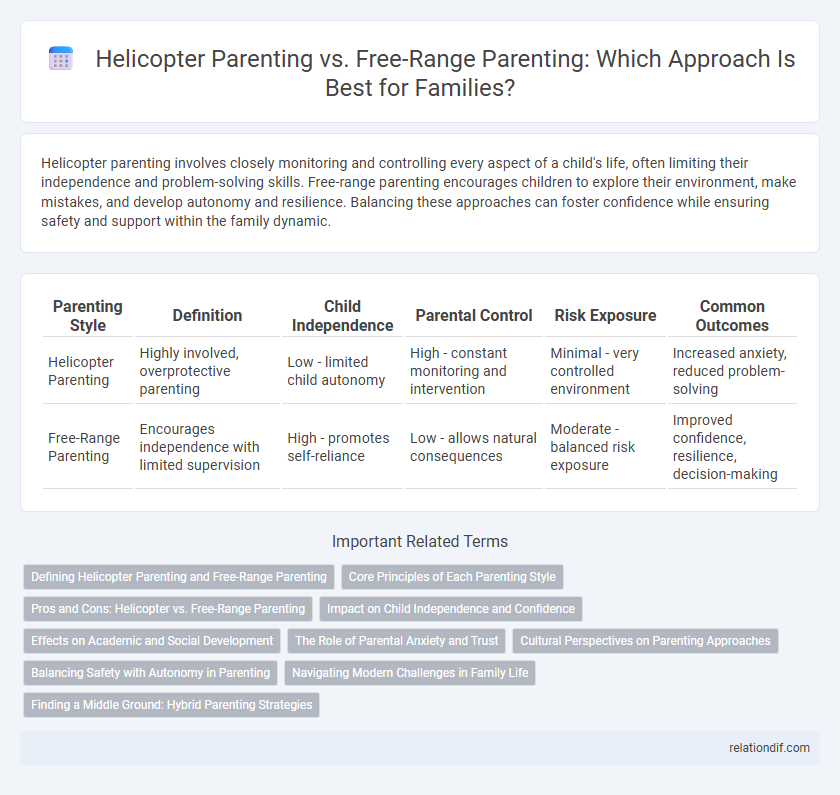Helicopter parenting involves closely monitoring and controlling every aspect of a child's life, often limiting their independence and problem-solving skills. Free-range parenting encourages children to explore their environment, make mistakes, and develop autonomy and resilience. Balancing these approaches can foster confidence while ensuring safety and support within the family dynamic.
Table of Comparison
| Parenting Style | Definition | Child Independence | Parental Control | Risk Exposure | Common Outcomes |
|---|---|---|---|---|---|
| Helicopter Parenting | Highly involved, overprotective parenting | Low - limited child autonomy | High - constant monitoring and intervention | Minimal - very controlled environment | Increased anxiety, reduced problem-solving |
| Free-Range Parenting | Encourages independence with limited supervision | High - promotes self-reliance | Low - allows natural consequences | Moderate - balanced risk exposure | Improved confidence, resilience, decision-making |
Defining Helicopter Parenting and Free-Range Parenting
Helicopter parenting involves close, excessive supervision and control over a child's activities to prevent failure or harm, often limiting the child's independence. Free-range parenting encourages autonomy by allowing children to explore, make decisions, and learn from natural consequences with minimal adult intervention. Both approaches impact child development differently, influencing confidence, problem-solving skills, and resilience.
Core Principles of Each Parenting Style
Helicopter parenting revolves around intense oversight and constant involvement, ensuring safety and achievement by closely monitoring children's activities and decisions. Free-range parenting emphasizes fostering independence and self-reliance by allowing children to explore and navigate risks within safe boundaries. Both parenting styles prioritize children's well-being but differ fundamentally in the balance between protection and autonomy.
Pros and Cons: Helicopter vs. Free-Range Parenting
Helicopter parenting ensures close supervision and safety, reducing risks of harm and academic failure, but may hinder children's independence and problem-solving skills. Free-range parenting promotes autonomy, resilience, and self-confidence by allowing children to explore and face challenges independently; however, it can expose children to potential dangers and heightened parental anxiety. Balancing supervision with freedom is key to fostering healthy development while minimizing risks in different family environments.
Impact on Child Independence and Confidence
Helicopter parenting limits child independence by closely monitoring every action, often resulting in lower self-confidence and reduced problem-solving abilities. Free-range parenting encourages children to explore and make decisions independently, fostering resilience and higher self-esteem. Studies reveal that free-range children tend to develop stronger critical thinking skills and better emotional regulation compared to those raised under helicopter supervision.
Effects on Academic and Social Development
Helicopter parenting often hinders academic independence, resulting in lower problem-solving skills and decreased motivation, while free-range parenting encourages self-reliance and resilience, fostering better critical thinking and decision-making abilities. Socially, helicopter parenting can limit peer interactions and reduce social competence, whereas free-range parenting promotes autonomy and emotional intelligence by allowing children to navigate social challenges independently. Research shows children raised with free-range parenting tend to exhibit higher self-esteem and adaptability in school environments compared to those experiencing helicopter parenting.
The Role of Parental Anxiety and Trust
Parental anxiety often drives helicopter parenting by fostering excessive control and monitoring to prevent potential harm, limiting a child's autonomy and problem-solving skills. Conversely, free-range parenting promotes trust in a child's abilities and decision-making, encouraging independence and resilience through measured risk-taking. Balancing parental concern with confidence in a child's competence is crucial for healthy emotional development and long-term self-efficacy.
Cultural Perspectives on Parenting Approaches
Cultural perspectives heavily influence parenting approaches, with helicopter parenting often prevalent in societies emphasizing academic achievement and safety, such as in East Asian countries. In contrast, free-range parenting aligns more with Western cultures that prioritize independence and risk-taking to foster resilience and self-reliance in children. Understanding these cultural contexts highlights how values shape parental involvement and children's development across different regions.
Balancing Safety with Autonomy in Parenting
Helicopter parenting overly controls children's activities, aiming to maximize safety but often limiting their independence and problem-solving skills. Free-range parenting encourages autonomy by allowing children to explore environments with minimal supervision, promoting resilience and decision-making abilities. Striking a balance involves setting clear safety boundaries while granting children freedom to develop self-confidence and responsibility.
Navigating Modern Challenges in Family Life
Helicopter parenting involves closely monitoring and controlling children's activities to prevent harm, often leading to reduced independence and problem-solving skills. Free-range parenting encourages autonomy and risk-taking within safe boundaries, fostering resilience and self-confidence. Balancing these approaches helps families navigate modern challenges by promoting safety while supporting children's growth and adaptability.
Finding a Middle Ground: Hybrid Parenting Strategies
Hybrid parenting strategies balance helicopter parenting's close supervision with free-range parenting's emphasis on independence, fostering both safety and self-reliance in children. Implementing structured freedom allows parents to set clear boundaries while encouraging problem-solving and decision-making skills. This middle ground supports emotional resilience by gradually increasing the child's autonomy within a secure and supportive environment.
helicopter parenting vs free-range parenting Infographic

 relationdif.com
relationdif.com